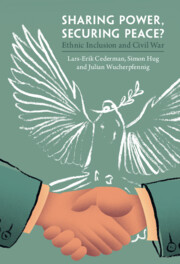Book contents
- Frontmatter
- Contents
- Figures
- Tables
- Preface
- 1 Introduction
- Part I Theories and Concepts
- Part II Analyzing the Effect of Power Sharing on CivilWar
- 4 Power Sharing and Civil War: Data and Baseline Models
- 5 Contrasting Formal Power-Sharing Institutions and Practices
- 6 Endogenizing Governmental Power Sharing and Its Effect on Civil War
- 7 The Strategic Logic of Governmental Power Sharing and Civil War
- 8 The Effect of Territorial and Governmental Power Sharing on Civil War
- 9 The Strategic Logic of Territorial Power Sharing, Secession and Civil War
- Part III Power Sharing and Civil War in Time and Space
- Bibliography
- Index
4 - Power Sharing and Civil War: Data and Baseline Models
from Part II - Analyzing the Effect of Power Sharing on CivilWar
Published online by Cambridge University Press: 23 June 2022
- Frontmatter
- Contents
- Figures
- Tables
- Preface
- 1 Introduction
- Part I Theories and Concepts
- Part II Analyzing the Effect of Power Sharing on CivilWar
- 4 Power Sharing and Civil War: Data and Baseline Models
- 5 Contrasting Formal Power-Sharing Institutions and Practices
- 6 Endogenizing Governmental Power Sharing and Its Effect on Civil War
- 7 The Strategic Logic of Governmental Power Sharing and Civil War
- 8 The Effect of Territorial and Governmental Power Sharing on Civil War
- 9 The Strategic Logic of Territorial Power Sharing, Secession and Civil War
- Part III Power Sharing and Civil War in Time and Space
- Bibliography
- Index
Summary
This chapter sets the stage for the empirical analyses that are presented in the following chapters. We first introduce data on power-sharing practices which are drawn from the Ethnic Power Relations (EPR) dataset, which documents ethnic groups' access to power since 1946. This part of the chapter introduces the data structures and describes trends in power sharing globally and by world region. It is shown that both territorial and governmental power sharing have seen increased use for several decades, with a possible tapering off in more recent years. We present a series of simple cross tabulations and regression analyses to set the baseline for the chapters to come. In the second part of the chapter, we turn to data on formal institutions. This part of the chapter relies on the new Inclusion Dispersion and Constraints (IDC) dataset that measures formal power-sharing provisions along several institutional dimensions. The chapter closes with an overview of how these data are used to address our Master Hypotheses in the subsequent empirical chapters.
Keywords
- Type
- Chapter
- Information
- Sharing Power, Securing Peace?Ethnic Inclusion and Civil War, pp. 45 - 74Publisher: Cambridge University PressPrint publication year: 2022

